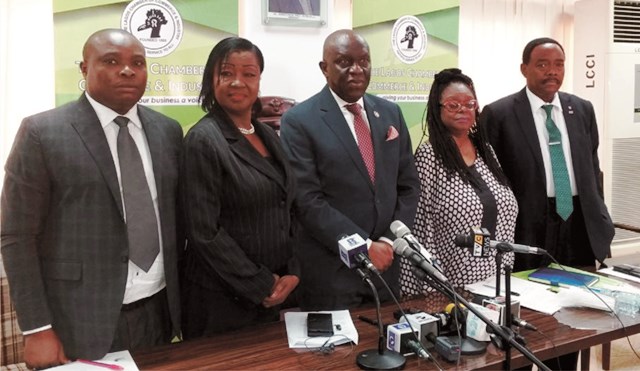Business
MAN Tasks Buhari On Economy

The Director-General of the Manufacturers Association of Nigeria (MAN), Mr Segun Ajayi-Kadir, says stability of economic policies and improvement on the existing economic platforms were the association’s expectations from the re-election of President Muhammadu Buhari.
Buhari was on Wednesday declared winner of Nigeria’s high stakes presidential election where 73 people slugged it out over the plum job.
Ajayi-Kadir told newsmen yesterday on the sidelines of a news conference at Ikeja on the 2019 Nigeria Manufacturing and Equipment Expo (NME), scheduled to hold from March 12 to March 14 in Lagos.
Ajayi-Kadir told Buhari to take stock of his administration’s past achievements and improve upon various policy initiatives, particularly the Ease of Doing Business and the implementation of the executive order 003.
He advised that a more concrete timeline for assessing and renovating the system must be put in place and accurately followed for the delivery of economic growth.
“We look forward to a deepening of all processes particularly the Economic Recovery and Growth Plan.
“There has to be an evaluation on performance, lapses and the involvement of a monitoring process that is inclusive of both the private and public sectors,’’ he said.
Addressing the NME Expo, the President of MAN, Mr Mansur Ahmed, explained that the expo was targeted at Small and Medium Enterprises and entrepreneurs to equip them with information on new processes and ways to boost their production outputs.
He disclosed that previous expos had made significant impact on the economy by providing opportunities for over 3,700 manufacturers to evaluate the latest manufacturing equipment and technologies.
“I expect that the expo will impact greatly on the Nigerian market as it provides exposure to the entire manufacturing value-chain.
“Over 3,700 manufacturers and manufacturing equipment distributors benefited from the expos of previous years.
“They were able to evaluate latest manufacturing equipment, machine tools and technologies which were on display by over 120 leading local and international suppliers from France, Italy, Germany, Nigeria and a host of other countries.
“The expo serves to contribute to the growth of the manufacturing sector through providing effective avenue for local manufacturers to source for equipment for retooling and alternative raw materials,’’ he said.
Director-General of the Raw Materials Research and Development Council, Prof. Hadiza Ibrahim, reiterated the mandate of the council at promoting the development and utilisation of the nation’s abundant natural resources.
This, she said, was to serve sustainable industrial inputs for manufacturing industries, its stakeholders to synergise, showcase and trade directly with the industrial sectors of MAN.
According to her, these can be achieved through the expo which promotes the diversification of the economy in line with the agenda of the government.
Business
Agency Gives Insight Into Its Inspection, Monitoring Operations

Business
BVN Enrolments Rise 6% To 67.8m In 2025 — NIBSS

The Nigeria Inter-Bank Settlement System (NIBSS) has said that Bank Verification Number (BVN) enrolments rose by 6.8 per cent year-on-year to 67.8 million as at December 2025, up from 63.5 million recorded in the corresponding period of 2024.
In a statement published on its website, NIBSS attributed the growth to stronger policy enforcement by the Central Bank of Nigeria (CBN) and the expansion of diaspora enrolment initiatives.
NIBSS noted that the expansion reinforces the BVN system’s central role in Nigeria’s financial inclusion drive and digital identity framework.
Another major driver, the statement said, was the rollout of the Non-Resident Bank Verification Number (NRBVN) initiative, which allows Nigerians in the diaspora to obtain a BVN remotely without physical presence in the country.
A five-year analysis by NIBSS showed consistent growth in BVN enrolments, rising from 51.9 million in 2021 to 56.0 million in 2022, 60.1 million in 2023, 63.5 million in 2024 and 67.8 million by December 2025. The steady increase reflects stronger compliance with biometric identity requirements and improved coverage of the national banking identity system.
However, NIBSS noted that BVN enrolments still lag the total number of active bank accounts, which exceeded 320 million as of March 2025.
The gap, it explained, is largely due to multiple bank accounts linked to single BVNs, as well as customers yet to complete enrolment, despite the progress recorded.
Business
AFAN Unveils Plans To Boost Food Production In 2026
-

 Sports3 days ago
Sports3 days agoTinubu Lauds Super Eagles’ after AFCON bronze triumph
-

 Sports3 days ago
Sports3 days agoFulham Manager Eager To Receive Iwobi, Others
-

 Sports3 days ago
Sports3 days agoAFCON: Lookman gives Nigeria third place
-

 Sports3 days ago
Sports3 days ago“Mikel’s Influence Prevent Some Players Invitation To S’Eagles Camp”
-

 Sports3 days ago
Sports3 days agoMan of The Match award Excites Nwabali
-

 Sports3 days ago
Sports3 days agoRemo, Ikorodu set for NPFL hearing, Today
-

 Sports3 days ago
Sports3 days agoPolice Games: LOC inspects facilities in Asaba
-

 Editorial3 days ago
Editorial3 days agoBeyond Accessing Bonny By Road

